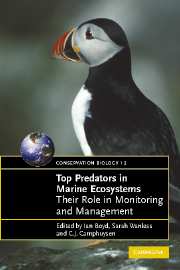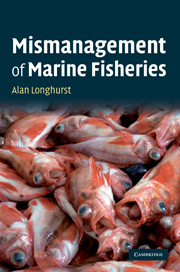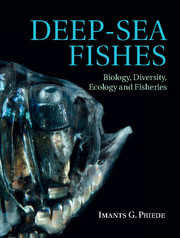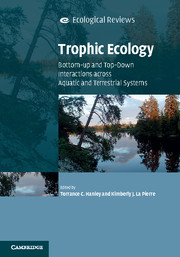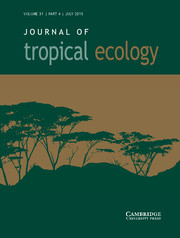Top Predators in Marine Ecosystems
Their Role in Monitoring and Management
$87.99 (C)
Part of Conservation Biology
- Editors:
- I. L. Boyd, University of St Andrews, Scotland
- S. Wanless, NERC Centre for Ecology and Hydrology, UK
- Author: C. J. Camphuysen, Royal Netherlands Institute for Sea Research
- Date Published: June 2006
- availability: Available
- format: Paperback
- isbn: 9780521612562
$
87.99
(C)
Paperback
Other available formats:
eBook
Looking for an examination copy?
If you are interested in the title for your course we can consider offering an examination copy. To register your interest please contact [email protected] providing details of the course you are teaching.
-
The sustainable exploitation of the marine environment depends upon our capacity to develop systems of management with predictable outcomes. Unfortunately, marine ecosystems are highly dynamic and this property could conflict with the objective of sustainable exploitation. This book investigates the theory that the population and behavioural dynamics of predators at the upper end of marine food chains can be used to assist with management. Since these species integrate the dynamics of marine ecosystems across a wide range of spatial and temporal scales, they offer new sources of information that can be formally used in setting management objectives. This book examines the current advances in the understanding of the ecology of marine predators and will investigate how information from these species could be used in management.
Read more- Explains how marine predators can be used to asses adverse impact on marine ecosystems
- Shows how an understanding of marine predator ecology can be used in the management of marine habitats
- An essential resource for conservation managers, researchers and students
Reviews & endorsements
"...does an excellent job of establishing the roles of top predators in marine ecosystem monitoring. The overview of the subject will be a great resource for seabird biologists and readers interested in marine ecology." - Carina Gjerdrum, Marine Ornithology
Customer reviews
Not yet reviewed
Be the first to review
Review was not posted due to profanity
×Product details
- Date Published: June 2006
- format: Paperback
- isbn: 9780521612562
- length: 392 pages
- dimensions: 229 x 153 x 19 mm
- weight: 0.632kg
- contains: 85 b/w illus. 9 tables
- availability: Available
Table of Contents
Preface
1. Introduction I. L. Boyd, S. Wanless and C. J. Campheysen
2. Effects of fisheries on ecosystems: just another top predator? Andrew W. Trites, Villy Christensen and Daniel Pauly
3. Physical forcing in the southwest Atlantic: ecosystem control P. N. Trathan, E. J. Murphy, J. Forcada, J. P. Croxall, K. Reid and S. E. Thorpe
4. The use of biologically meaningful oceanographic indices to separate the effects of climate and fisheries on seabird breeding success B. E. Scott, J. Sharples, S. Wanless, O. Ross, M. Frederiksen and F. Daunt
5. Linking predator foraging behaviour and diet with variability in continental shelf ecosystems: grey seals of eastern Canada W. D. Bowen, C. A. Beck, S. J. Iverson, D. Austin, and J. I. McMillan
6. Distribution and foraging interactions of seabirds and marine mammals in the North Sea: multi-species foraging assemblages and habitat-specific feeding strategies. C. J. Camphuysen, Beth Scott and Sarah Wanless
7. Spatial and temporal variation in the diets of polar bears across the Canadian Arctic: indicators of changes in prey populations and environment Sara J. Iverson, Ian Stirling, and Shelley L. C. Lang
8. Biophysical influences on seabird trophic assessments W. A. Montevecchi, S. Garthe and G. K. Davoren
9. Consequences of prey distribution for the foraging behaviour of top predators Iain J Staniland, Phil Trathan and Anthony R. Martin
10. Identifying drivers of change
did fisheries play a role in the spread of North Atlantic fulmars? Paul M. Thompson
11. Monitoring predator-prey interactions using multiple predator species: the South Georgia experience J. P. Croxall
12. Impacts of oceanography on the foraging dynamics of seabirds in the North Sea F. Daunt, S. Wanless, G. Peters, S. Benvenuti, J. Sharples, D. Grémillet and B. Scott
13. Foraging energetics of North Sea birds confronted with fluctuating prey availability M. R. Enstipp, F. Daunt, S. Wanless, E. M. Humphreys, K. C. Hamer, S. Benvenuti and D. Grémillet
14. How many fish should we leave in the sea for seabirds and marine mammals? Robert W. Furness
15. Does the prohibition of industrial fishing for sandeels have any impact on local gadoid populations? Simon P. R. Greenstreet
16. Use of gannets to monitor prey availability in the NE Atlantic Ocean: colony size, diet and foraging behaviour Keith C. Hamer, Sue Lewis, Sarah Wanless, Richard A. Phillips, Tom N. Sherratt, Elizabeth M. Humphreys, Janos Hennicke and Stefan Garthe
17. Population dynamics of Antarctic krill Euphausia superba at South Georgia - sampling with predators provides new insights K. Reid, E. J. Murphy, J. P. Croxall and P. N. Trathan
18. The functional response of generalist predators and its implications for the monitoring of marine ecosystems Christian Asseburg, John Harwood, Jason Matthiopoulos and Sophie Smout
19. The method of multiple hypotheses and the decline of Steller Sea Lions in western Alaska Nicholas Wolf, Jason Melbourne and Marc Mangel
20. Modelling the behaviour of individuals and groups of animals foraging in heterogeneous environments J. G. Ollason, J. M. Yearsley, K. Liu and N. Ren
21. The scenario Barents Sea study: a case of minimal realistic modelling to compare management strategies for marine ecosystems Tore Schweder
22. Setting management goals using information from predators Andrew J. Constable
23. Marine reserves and higher predators Sascha K. Hooker
24. Marine management: can objectives be set for marine top predators? Mark L. Tasker.
Sorry, this resource is locked
Please register or sign in to request access. If you are having problems accessing these resources please email [email protected]
Register Sign in» Proceed
You are now leaving the Cambridge University Press website. Your eBook purchase and download will be completed by our partner www.ebooks.com. Please see the permission section of the www.ebooks.com catalogue page for details of the print & copy limits on our eBooks.
Continue ×Are you sure you want to delete your account?
This cannot be undone.
Thank you for your feedback which will help us improve our service.
If you requested a response, we will make sure to get back to you shortly.
×
